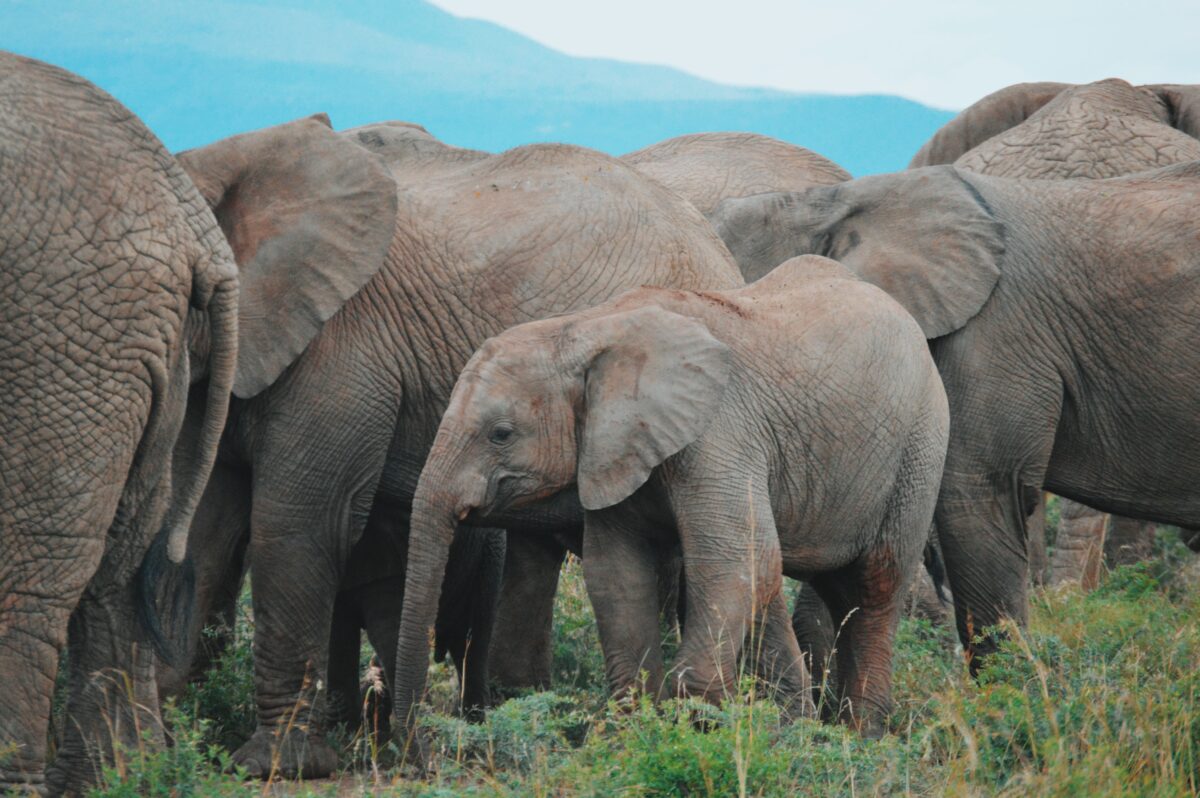Last November, President Trump announced the reversal of a 2014 ban on elephant trophy imports from Zimbabwe and Zambia. Following backlash from animal rights and conservation activists, Trump placed the reversal on hold two days later “until such time as I review all conservation facts.” African elephants remain an endangered and dwindling species – the 2016 African Elephant Status Report estimated the African elephant population to be 415,428, a 104,000-114,000 drop since 2006. While a ban on elephant trophy hunting sounds like a compelling conservation strategy, elephant population declines have stemmed primarily from illegal poaching, and legal trophy hunting can provide much-needed money for elephant conservation efforts.
From a purely economic standpoint, legalized and commercialized trophy hunting ensures the continued supply of elephants by giving them monetary value. While the ethics of treating animals as commodities are debatable, economic language proves extremely useful in describing the link between trophy hunting and conservation. Economists use the term “common resource” to describe commodities for which there is no way to prevent people from using the commodity and for which one person’s use of the commodity diminishes the quantity and/or quality of the commodity for others. Wild elephants are a common resource because people cannot be prevented from hunting them and every person who kills an elephant diminishes the quantity of elephants available for future hunters. Policies such as granting land owners ownership of the elephants on their land and charging a fee to hunt said elephants would make elephants more excludable, result in less hunting, and generate revenue for the conservation of elephant populations.
These elephant monetization policies work well when executed properly. In 1996, the government of Namibia began granting rural communities the power to work with private ecotourism companies to create markets for elephant trophy hunting. The program has generated millions of dollars for rural conservancies, providing $75 per month for one in seven Namibians. According to the Namibia Nature Foundation, Namibia’s total elephant population rose from 10,143 in 1998 to 16,397 in 2004. Some other countries, like South Africa and Kenya, have found success with similar conservation approaches, while most countries that have neglected to implement these conservation strategies, like Tanzania and Mozambique, have had their elephant populations destroyed. While it is counterintuitive to legalize the killing of elephants in order to protect them, in reality, it may be the most promising approach.
In writing, Zimbabwe has embraced these conservation strategies as well. One of Zimbabwe’s key elephant conservation efforts is an organization called CAMPFIRE (Community Areas Management Programme for Indigenous Resources). CAMPFIRE directly pays a large portion of their revenue (70% of which comes from elephant trophy hunting) back to rural communities so they can afford to manage their land. CAMPFIRE serves around 777,000 rural and impoverished households, each with an average income of $1 per day. Through CAMPFIRE’s work, rural communities improve their relationships with elephants and are incentivized to manage the elephant populations. While many people see elephants as a nuisance due to their destructive behavior, CAMPFIRE shows these communities that elephants bring immense value to their land.
Though Zimbabwe’s efforts sound exciting, their corrupt government has recently undermined the credibility of their organizations. In recent months, Zimbabwe has endured political chaos: the Zimbabwean army captured their (former) president Robert Mugabe and placed him under house arrest, forcing him to resign and allowing Emmerson Mnangagwa to take over. Amid drastic and contentious changes to the Zimbabwean government, people have doubted the functionality and integrity of Zimbabwe’s elephant conservation efforts. Many speculate that corrupt government officials steal the money from trophy hunters for themselves, denying rural communities the funding they need to conserve elephants. Based on Zimbabwe’s elephant population trends in recent years, these speculations may have merit. Zimbabwe suffered a 6% decrease in elephant populations across the board from 2006 to 2014. Within the four regions of the country where elephants congregate, two regions experienced growth and two experienced decline. Elephant conservation through trophy hunting only works if the revenue truly goes back into conservation efforts.
In light of this corruption, President Obama’s 2014 ban on Zimbabwean elephant trophy imports served not as a myopic undermining of trophy hunting as a conservation strategy but as a prompt for Zimbabwe to reexamine their corruption. Economists and politicians debate the idea of using protection policies as a bargaining chip to prompt other countries to change. Proponents argue that the other country would change, motivated to restore free trade. Critics point out that if the other country does not change, as is the case with Zimbabwe, the first country suffers: either they keep the protection and hurt their economy or they remove the protection and appear weak on the international stage. In deciding whether to support or oppose the ban reversal, Americans must decide whether the former ban is effective as a bargaining chip, and also whether there should be greater value placed on the lives of individual elephants or on the survival of the species.
Ethical questions surrounding the conservation through trophy hunting strategy prove difficult as both sides are so morally flawed. Alternate policies, such as using revenue from tourists and photographers, prove ineffective because tourists refuse to pay the exorbitant prices that trophy hunters pay for their animals. Also, people hunt elephants not just for trophies, but to harvest ivory, which, while internationally illegal to trade, is extremely valuable in Chinese culture for its aesthetic properties and toolmaking utility. In contemplating the ethics of hunting, one must consider both the costs and the benefits, including subsistence, overpopulation management, sport, or obtaining or selling valuable parts of the animal.
During an interview in the 2017 documentary Trophy, John Hume, a South African who owns the world’s largest rhinoceros farm, says, “Give me one animal that has gone extinct while farmers were breeding it and making money out of it. There’s not one.” Hume’s point, that humans will always conserve something that generates profit, demonstrates the potential for legalized trophy hunting. As Zimbabwe recovers from its recent political trauma, and the United States decides whether or not to reverse the 2014 ban, the future of Zimbabwe’s elephants remains unclear.
Sources
AFP. (2018, January 11). Robert Mugabe Ousted by ‘Military Coup’ Claims Ex-Minister. Daily Nation. Retrieved from https://www.nation.co.ke/news/africa/Mugabe-ousted-by-military-coup-claims-ex-minister/1066-4259934-c5ykcq/index.html
Baker, A. (2017, September 6). Trophy Is a Striking Look at Big Game Hunting and Conservation. Time. Retrieved from http://time.com/4926847/trophy-documentary-shaul-schwarz/
Choudhury, A., Lahiri Choudhury, D.K., Desai, A., Duckworth, J.W., Easa, P.S., Johnsingh, A.J.T., Fernando, P., Hedges, S., Gunawardena, M., Kurt, F., Karanth, U., Lister, A., Menon, V., Riddle, H., Rübel, A. & Wikramanayake, E. (IUCN SSC Asian Elephant Specialist Group). (2008). Elephas Maximus. Retrieved February, 2018, from http://www.iucnredlist.org/details/7140/0
Cruise, A. (2017, November 17). Is Trophy Hunting Helping Save African Elephants? National Geographic. Retrieved from https://news.nationalgeographic.com/2015/11/151715-conservation-trophy-hunting-elephants-tusks-poaching-zimbabwe-namibia/
C.R. Thouless, H.T. Dublin, J.J. Blanc, D.P. Skinner, T.E. Daniel, R.D. Taylor, F. Maisels, H.L. Frederick and P. Bouché (2016). African Elephant Status Report 2016: an update from the African Elephant Database. Occasional Paper Series of the IUCN Species Survival
Commission, No. 60 IUCN / SSC Africa Elephant Specialist Group. IUCN, Gland, Switzerland. vi + 309pp.
Eilperin, J., & Fears, D. (2017, November 17). Trump Puts Hold on This Week’s Decision to Again Allow Trophies From Elephant Hunts in Zimbabwe. Washington Post. Retrieved from https://www.washingtonpost.com/news/animalia/wp/2017/11/15/trophies-from-elephant-hunts-in-zimbabwe-were-banned-in-the-u-s-trump-just-reversed-that/?utm_term=.84e7eaffc631
Mankiw, N. G. (2017). Principles of Microeconomics (8th ed.). Boston, MA: Cengage Learning.
Namibia Nature Foundation. (n.d.). Elephant >> Numbers – Namibia. Retrieved February, 2018, from http://www.nnf.org.na/RARESPECIES/InfoSys/elephant/numbers/La_NaOverall.htm
Nelson, F., Kerasote, T., Roger J. H. King, Bateson, P., Eves, H., Wolf, C., & Yaich, S. (2005).
The Ethics of Hunting. Frontiers in Ecology and the Environment, 3(7), 392-397. doi:10.2307/3868590
Tambini, J. (2017, November 24). Who is the New President of Zimbabwe? The Crocodile Takes Over From Robert Mugabe. Express. Retrieved from https://www.express.co.uk/news/world/883896/Zimbabwe-new-president-who-is-Emmerson-Mnangagwa-The-Crocodile-coup-Mugabe
Robert Mugabe Fires Deputy Emmerson Mnangagwa. (2017, Fall). Eyewitness News. Retrieved from http://ewn.co.za/2017/11/06/mugabe-fires-deputy-mnangagwa
Rosen, R. J. (2012, September 6). What Is It About an Elephant’s Tusks That Makes Them So Valuable? The Atlantic. Retrieved from
https://www.theatlantic.com/business/archive/2012/09/what-is-it-about-an-elephants-tusk
s-that-make-them-so-valuable/262021/
Schwartz, S., & Clusiau, C. (Directors). (2017). Trophy [Video file]. USA: CNN Films, The Orchard. Retrieved from https://play.google.com/store/movies/details?id=z76YdVD0Wzc
Youth Wing Leader of Mugabe’s Party Says Sorry Amid Zimbabwe ‘Coup’. (2017, November 15). Sky News. Retrieved from https://news.sky.com/story/robert-mugabes-wife-grace-flees-zimbabwe-amid-army-takeover-11127740
Zimbabwe Parks and Wildlife Management Authority – The Zambezi Society. (2017). Zimbabwe National Elephant Management Plan (2015-2020). Retrieved from https://conservationaction.co.za/resources/reports/zimbabwe-national-elephant-management-plan-2015-2020/
Zimbabwe Parks and Wildlife Management Authority. (2016, April). The Zambezi Society (Zimbabwe, Zimbabwe Parks and Wildlife Management Authority). Retrieved from http://www.zamsoc.org/wp-content/uploads/2016/04/ZIMBABWE-ELEPHANT-MANAGEME

